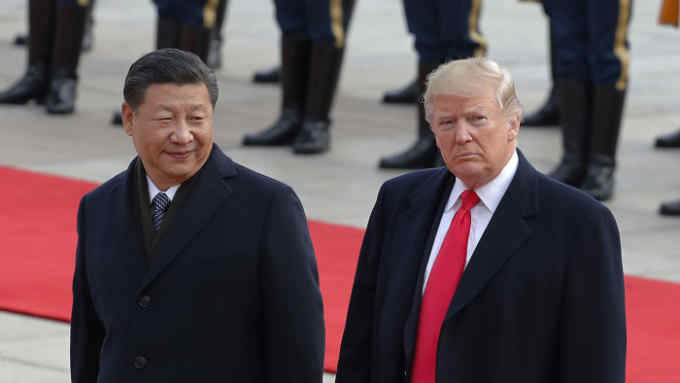Do global businesses have too much power?


Roula Khalaf, Editor of the FT, selects her favourite stories in this weekly newsletter.
When Alexandria Ocasio-Cortez, the Democratic US congresswoman, recently subjected Mark Zuckerberg of Facebook to a fierce grilling over how his company deals with political advertisements, it was a powerful moment in the global tussle between politicians and business leaders.
Corporate fiat is increasingly being tested in the court of public opinion, and not only by politicians. The Extinction Rebellion protests in London against carbon emissions and global warming have included demonstrations against energy companies for their role. It is an uncomfortable age for business leaders deemed to be behaving unethically, even if they obey the law.
In the era of the internet and global communications, protests against corporate power know no national boundaries. Not only can they spread across countries with the right leadership, as Greta Thunberg, the 16-year-old Swedish environmental activist has shown, but moments such as Ms Ocasio-Ortez’s questioning of Mr Zuckerberg produce clips that are seen globally.
The growth of public shaming masks an underlying institutional weakness. There is very limited corporate governance at a global scale, and companies are largely bound by national laws, rather than international treaties. As the Brexit debate in the UK shows, politicians often guard jealously the right to set their own regulatory standards and tax policies.

The exceptions tend to involve the co-ordination of national policies, for example by the Basel committee of central bank supervisors, or the OECD’s framework for corporate taxation. Corporate governance is largely a domestic affair, and in the case of the US a state matter. Most disputes between managers and investors are settled in Delaware’s chancery court.
International Governance
FT correspondents dissect the common challenges facing the world from the cyber arms race to the migration crisis. Explore the rest of the report
Gideon Rachman: Blows to rules-based order hurt readiness for future crises
Individual leaders’ insistence on sovereignty masks usefulness of international organisations
Jude Webber: The world has capacity but lacks the will to manage migration
Many people fleeing hardship or climate change do not qualify for the asylum they seek
Siddharth Venkataramakrishnan: Experts struggle to set red lines for cyber warfare
Nations hope for global framework to control attacks on digital technology
Subscribers can receive alerts when new content is published in this series by following ‘World’ with myFT.
While US federal institutions such as the Securities and Exchange Commission, the Federal Trade Commission and the Federal Reserve all play an active role in overseeing companies, state oversight is still important. The insurance industry is supervised by state regulators, and the SEC has to tread carefully in influencing matters such as dual-class share voting rights.
The dynamic is similar in Europe, as the European Commission enforces antitrust policy while countries including Germany and France press for leeway for pan-European mergers to form industrial champions. A lot of regulatory standards are set from Brussels thanks to the single market, but corporate governance and shareholder rights vary by country.
The rise of the global corporation has placed this patchwork of local, national and continental oversight under strain. This is true of taxation, as governments strain to raise taxes on technology platforms such as Facebook and Google without provoking them to relocate. It is also true of governance in general, as companies become detached from territories.
Technology has not only encouraged the rise of powerful global platforms, but also more broadly allowed companies to shift intellectual property to gain from lighter regulations and tax arbitrage. The company needs a sales and marketing presence in countries with large markets, but can locate its research and development operations and head office where it chooses.

Many companies have exercised power so imaginatively and ruthlessly that they have caused a backlash. Corporations face loud criticism on issues from tax avoidance to environmental damage and paying low wages. Public discontent over inequality has landed at their door, amid the feeling that they have accumulated too much power and need to be restrained.
The tough question is how to do it. The simple answer is with more global oversight, making it impossible for businesses to evade regulations simply by moving around. That is the OECD’s approach to corporate taxation, bringing together countries to thrash out its proposals for tax reform unveiled last month. It was an exceptional case of consensus building.
But global rules take years to be agreed, with the constant danger of descending into gridlock, like trade talks. Political tensions between the US and China work in the opposite direction, with Huawei barred from the US telecommunications market on security grounds. European and US antitrust has diverged as the EU has intervened to sanction technology platforms.
The rules of stock exchanges and national regulators on the listing of companies with dual-class voting shares show how businesses still have the power to get corporate governance regulations changed. Hong Kong changed its rules to permit such listings last year after Alibaba listed in New York in 2014; the New York Stock Exchange itself used to prohibit split voting rights.
Beyond corporate bargaining power, there are political reasons why companies are likely to remain largely nationally supervised. Governments do not answer to international consensus but to local voters. While an instinct that companies are too powerful is quite common, electorates want their politicians to respond nationally by imposing distinctive rules.
It is easier for activists to protest, and for politicians to grill business leaders publicly, than to pass laws and regulations — and to stop those laws being undermined by the mobility of corporations. Mr Zuckerberg will face other tricky occasions before politicians and in the glare of publicity. But the chances of them collaborating to govern Facebook globally are small.

Comments